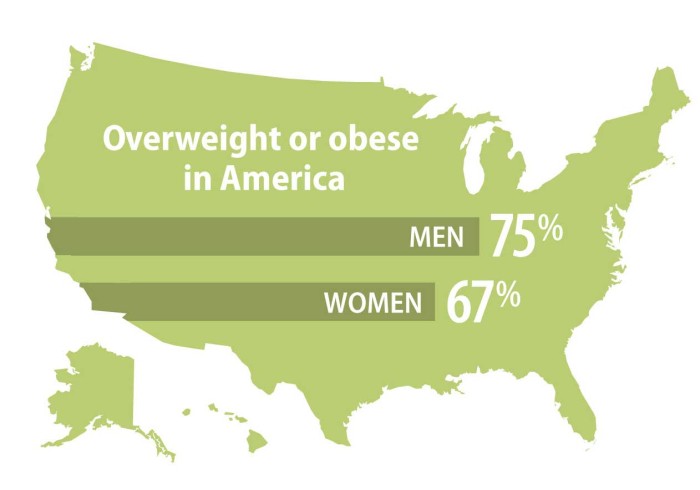More Americans now obese than overweight
New finding is "a wake-up call" to make public health strategies a priority

In the U.S., nearly 75 percent of men and 67 percent of women age 25 or older are overweight or obese, according to a new study by Washington University School of Medicine researchers.
Obesity and excess weight negatively influence health and have become a significant focus for health-care professionals. Research at Washington University School of Medicine confirms the problem is only getting worse.
The study, which used data from 2007-12, indicates nearly 75 percent of men and 67 percent of women are overweight or obese. This is an increase from findings of a study published in 1999 that estimated 63 percent of men and 55 percent of women age 25 and older were overweight or obese.
“This is a wake-up call to implement policies and practices designed to combat overweight and obesity,” said the study’s first author, Lin Yang, PhD, a postdoctoral research associate in public health at the School of Medicine.
The new findings also estimate that 67.6 million adult Americans over the age of 25 are obese, and an additional 65.2 million are overweight.
In the new study, Yang and Graham A. Colditz, MD, DrPH, a disease-prevention expert and deputy director of the university’s Institute for Public Health, estimated the prevalence of obesity and those who are considered overweight, by gender, age and race/ethnicity. The sample size included 15,208 men and women aged 25 and older, which is representative of more than 188 million people.
Their data showed:
- Among African-Americans: 39 percent of men and 57 percent of women are obese.
- Among Mexican-Americans: 38 percent of men and 43 percent of women are obese.
- Among Caucasians: 35 percent of men and 34 percent of women are obese.
Public health strategies
The authors suggest that public health experts should focus efforts in three key areas to fight obesity, including:
- Changes to the physical environment: For example, implementing bike lanes and more pedestrian-friendly areas in cities.
- Leveraging primary care prevention and treatment efforts: For example, discussing diet and physical activity strategies with patients.
- Altering societal norms of behavior: For example, raising awareness about the cost-saving benefits of weight loss.
“Delivering these strategies is a priority to counter the burden of obesity on contemporary and future generations,” the researchers noted.
Colditz, who is the associate director of prevention and control at Siteman Cancer Center at Barnes-Jewish Hospital and Washington University School of Medicine, focuses much of his research on disease prevention.
“There are many things we can do to interrupt this worrisome and costly trend, and the benefits go well beyond what’s obvious to the eye,” Colditz said. “Some cancers, for example, can be prevented by eating a healthy diet, exercising and keeping weight in check. We need to do what we can to change behaviors of current and future generations to reverse this preventable societal burden.”
Obesity-related projects at the Institute for Public Health
Preventing obesity at home and in the workplace
Description: Assessing community and business environments to encourage healthy lifestyles that can help prevent obesity and obesity-related cancers.
Researchers: Aaron Hipp, PhD, and Ross Brownson, PhD
Funding: Transdisciplinary Research on Energetics and Cancer (TREC) Center core project
Preventing obesity-related cancer in women
Description: Implementing obesity education in obstetrics and gynecology clinics to help prevent obesity-related cancers that affect women.
Researchers: Andrea Hagemann, MD, and Lin Yang, PhD
Funding: Transdisciplinary Research on Energetics and Cancer (TREC) Center development project
Playground accessibility in St. Louis neighborhoods
Description: Documenting playground accessibility and safety in 79 St. Louis neighborhoods to identify disparities and develop strategies for children to achieve healthy weights.
Researchers: Cassandra Arroyo-Johnson, PhD
Funding: Robert Wood Johnson Foundation
For more information, visit the Institute for Public Health’s website.







